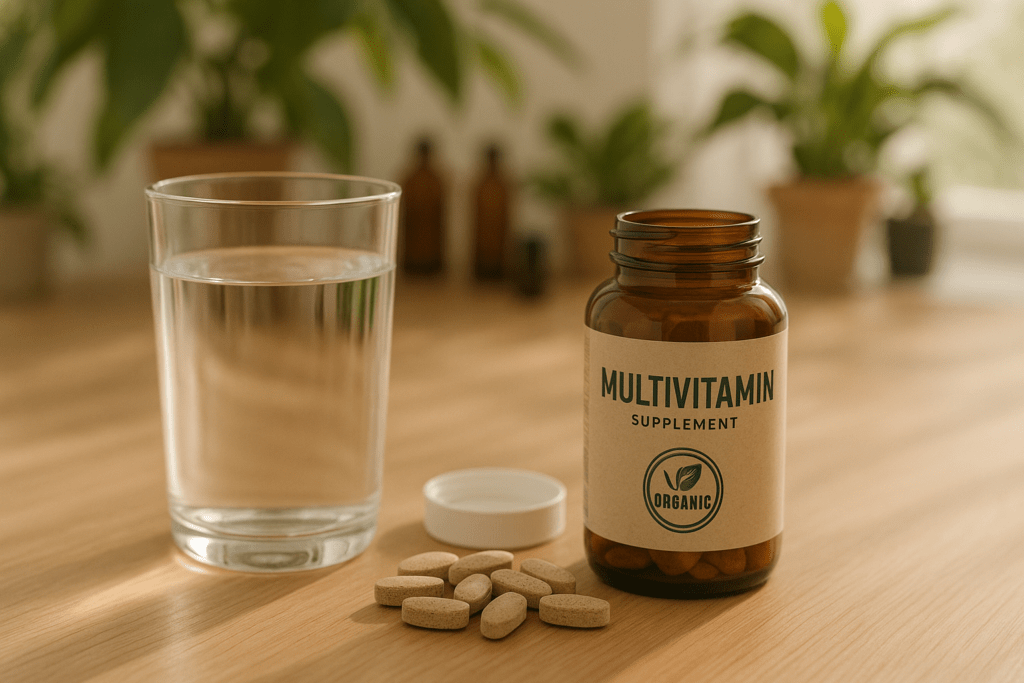Organic Multivitamins: A Comprehensive Guide
In today’s world, more and more people are interested in natural and organic products, especially when it comes to their health. Organic multivitamins are supplements made from organically grown, minimally processed plant or mineral ingredients that are free of synthetic additives or pesticide residues. These supplements are becoming increasingly popular among health-conscious people looking for more natural alternatives to conventional synthetic vitamins.
In this comprehensive guide, you will learn what organic multivitamins really are, how they differ from conventional synthetic supplements, what their advantages and disadvantages are, how to choose the right product for you, and how they can contribute to improving your overall health.
What are organic multivitamins?
Organic multivitamins are dietary supplements made from organically grown plants, fruits, vegetables, and other natural sources.

Unlike synthetic vitamins, which are chemically produced in laboratories, organic multivitamins are derived from real foods grown without the use of chemical fertilizers, pesticides, and other synthetic substances.
In order for a product to be called “organic,” it must meet strict standards and certification requirements. In Europe, this is regulated by the EU Organic certification system, and in the United States, by the USDA Organic certification. These certifications ensure that the ingredients in the product were grown in accordance with organic farming principles, without synthetic pesticides, genetically modified organisms (GMOs), or artificial additives.
True organic multivitamins usually have “clean” labels – they do not contain artificial colors, preservatives, flavor enhancers, sweeteners, and other potentially harmful additives. Most are also vegan, gluten-free, and suitable for a variety of diets.
How Organic Multivitamins Are Made:
The process for making organic multivitamins is quite different from conventional synthetic supplements. First, the raw materials are grown on certified organic farms, where the soil is rich in natural minerals and trace elements, without the use of chemical fertilizers or pesticides.

After harvesting, the plants are processed using low-temperature methods to preserve their natural vitamins and minerals. The most common processes used are cold pressing, lyophilization (freeze drying), and other minimal processing technologies that allow for maximum nutrient retention.
The result is a complete, food-grade complex in which vitamins remain in their natural form along with phytochemicals, antioxidants, and other beneficial substances that help improve vitamin absorption.
Benefits of Organic Multivitamins:
The popularity of organic multivitamins is growing for a reason. Let’s take a look at the main benefits that make people choose organic multivitamins over conventional synthetic supplements.
One of the most important benefits is better bioavailability. Organic multivitamins are closer to what our bodies recognize as food, which is why many experts believe they are better absorbed. Synthetic vitamins are often produced in the form of isolated chemical compounds, while organic multivitamins preserve the natural complex forms of nutrients along with cofactors that help them be absorbed.
Organic multivitamins also have a natural synergistic effect. In nature, vitamins and minerals work together with various phytochemicals, enzymes and other substances that enhance each other’s actions. This synergistic effect is often lost in synthetic supplements.
In addition, organic multivitamins do not contain potentially harmful additives such as artificial colors, preservatives, stabilizers or binders. This is especially important for people with allergies or sensitivities to certain synthetic compounds.
Choosing an organic multivitamin is also a greener and more sustainable option. Organic farming is less polluting and helps preserve soil fertility and biodiversity.
Potential Risks and Considerations:
While organic multivitamins have many benefits, it is important to understand that the word “organic” alone does not guarantee complete safety or effectiveness. As with any dietary supplement, there are certain risks and considerations to be aware of.
One of the main challenges is the variability of the composition. Since organic multivitamins are made from natural sources, their composition can vary depending on the harvest season, growing conditions, or manufacturing processes. For this reason, the exact amount of vitamins and minerals may differ slightly from what is stated on the package.
It is also worth noting that organic multivitamins may contain lower concentrations of certain vitamins compared to synthetic counterparts. This is not always a disadvantage – in many cases, a better-absorbed natural vitamin, even in a smaller amount, can be more beneficial than a large dose of a synthetic version.
Although organic multivitamins are generally hypoallergenic, people with food allergies (such as yeast, mold, or certain vegetables) should still check the ingredients carefully.
Finally, organic multivitamins are often more expensive than synthetic ones. This is natural, given the more complex growing and manufacturing process, but it can be an important factor in your decision.
Key Ingredients in Organic Multivitamins:
Quality organic multivitamins are usually made from a variety of natural sources that provide a wide range of vitamins, minerals, and other beneficial nutrients. Let’s take a look at the most commonly used ingredients and their origins.
Organic multivitamins often contain ingredients from the following sources:
Organic fruit and vegetable concentrates – a natural source of vitamins A, C, K and B vitamins. Concentrates of carrots, spinach, beets, cranberries, blueberries and other berries are often used.
Nutritional yeast – an excellent source of B vitamins, especially B12, which is often lacking in vegetarian and vegan diets.
Spirulina and chlorella – algae rich in protein, vitamins, minerals and chlorophyll.
Acerola cherries – one of the richest natural sources of vitamin C.
Olive leaves – a source of antioxidants that help strengthen the immune system.
Sea vegetables – a natural source of iodine and other important minerals.
Ascorbic acid from tapioca – a natural source of vitamin C.
Organic herbs – nettles, dandelions, chamomile and other herbs that provide additional trace elements and phytochemicals.
Minerals in organic multivitamins are usually derived from natural sources, such as:
Calcium – from seaweed or plant sources, rather than calcium carbonate or other synthetic compounds.
Magnesium – from seawater, magnesium citrate, or another organic form that is more easily absorbed.
Iron – often obtained from food sources such as spinach or other leafy greens.
Zinc – often found in organic multivitamins as zinc gluconate or zinc citrate.
Manufacturers are increasingly including adaptogenic ingredients such as ashwagandha, ginseng, or reishi mushrooms in organic multivitamins, which help the body adapt to stress and enhance overall health.
It is important to note that in true organic multivitamins, these ingredients must be grown in accordance with organic farming principles and have the appropriate certifications confirming their organicity.
How to Choose the Right Organic Multivitamin?
With so many products on the market, choosing the right organic multivitamin can be a daunting task. Here are some important things to consider when choosing a quality organic multivitamin.
First, look for certifications. Look for products that have reliable organic certifications, such as EU Organic, USDA Organic, or other internationally recognized certification bodies.

These certifications confirm that the product meets strict organic production standards.
Carefully examine the ingredient list. A quality organic multivitamin should clearly list all ingredients and their origin. Avoid products that contain unclear ingredients, artificial additives, or synthetic vitamins (often labeled with chemical names).
Also pay attention to the forms of vitamins – look for “active” or “methylated” forms (for example, methylcobalamin instead of cyanocobalamin for vitamin B12, or 5-MTHF instead of folic acid), which are more easily absorbed by the body.
Evaluate the amounts of vitamins and minerals. A quality organic multivitamin should provide a balanced amount of nutrients that meet the recommended daily allowances, but not too much of them. Excessive doses of certain vitamins or minerals are not always beneficial and can even be harmful in some cases.
Consider your specific needs. Different people need different multivitamins, depending on their age, gender, lifestyle, and health status. For example, pregnant women need higher levels of folic acid and iron, while vegans need extra vitamin B12.
It’s also worth paying attention to the reputation of the manufacturer. Choose companies that are transparent about their manufacturing processes, conduct third-party testing, and can provide quality certifications.
Organic Multivitamins for Different Groups:
Different age groups and people with special needs require different multivitamins. Here are some specific aspects to consider.
Organic multivitamins for children usually have lower doses of vitamins and minerals, tailored to the growing body.

They often come in attractive forms (such as gummies) and have a pleasant taste, but it is important to make sure that they do not contain added sugar or artificial sweeteners.
Organic multivitamins for pregnant and breastfeeding women should provide adequate amounts of folic acid, iron, calcium and DHA, which are essential for the health of both mother and child. In this case, it is especially important to choose products without potentially harmful additives.
Organic multivitamins for older adults often contain higher levels of vitamin D, B12, calcium and magnesium, which are important for maintaining bone strength and improving neurological function.
Organic multivitamins for athletes and active people may contain additional ingredients such as adaptogens, antioxidants and electrolytes to help recover from exercise and optimize energy production.
Organic multivitamins for vegans must definitely contain vitamin B12, which is lacking in plant-based products, as well as adequate amounts of vitamin D, omega-3 fatty acids, zinc and iron.
Organic vs. Synthetic Multivitamins: Key Differences
To make an informed decision about your multivitamin, it’s important to understand the key differences between organic and synthetic multivitamins. These differences include not only the manufacturing process, but also bioavailability, composition, and health effects.
The first and most important difference is origin. Organic multivitamins are made from natural food sources, organically grown plants, while synthetic vitamins are created in laboratories by chemical synthesis. This also results in a different molecular structure – synthetic vitamins are often isolated compounds, while organic multivitamins preserve the natural forms of vitamins along with other components.
Bioavailability is another important difference. Many studies show that organic vitamins are easier to recognize and absorb by the body because they remain closer to their natural form. Synthetic vitamins often lack important cofactors that help the body absorb them.
Organic multivitamins are “complete” – the vitamins and minerals they contain are provided along with their natural accompanying substances, such as phytochemicals, antioxidants and enzymes. Synthetic multivitamins usually only contain the essential vitamins and minerals in isolated form.
The advantage of synthetic multivitamins is their precise and standardized dosage. Each tablet or capsule contains the exact amount of each vitamin or mineral. In organic multivitamins, this amount may vary slightly depending on the natural sources.
In terms of price, synthetic multivitamins are usually much cheaper, as their production is simpler and more automated. The production of organic multivitamins requires more resources, time and responsible farming.
In terms of sustainability, organic multivitamins have a lower environmental impact, as they do not use toxic chemicals and synthetic fertilizers in their production. Organic farming also contributes to soil fertility, the preservation of biodiversity and less water pollution.
Finally, organic multivitamins typically do not contain synthetic additives such as artificial colors, preservatives, stabilizers, or binders, which are often used in synthetic supplements and can cause adverse reactions in some people.
Conclusion: Are Organic Multivitamins Worth It?
The decision to choose an organic multivitamin should be based on your personal perspective on health, nutrition, and lifestyle. To summarize this comprehensive guide, here are some key points to consider.
Organic multivitamins offer a holistic approach to supplementation, providing vitamins and minerals in their natural form, along with other beneficial nutrients. They are especially beneficial for people who want to avoid synthetic ingredients, have sensitivities to certain chemical additives, or prefer natural alternatives.
While organic multivitamins are typically more expensive than synthetic ones, many consumers find the extra investment worthwhile due to their potentially better bioavailability, cleaner ingredients, and greener manufacturing processes.
However, it’s important to note that even the highest-quality organic multivitamins are not a miracle cure-all. They should be used as a supplement to a balanced diet, not a replacement for it.
It is recommended that you consult a healthcare professional before taking any supplements, including organic multivitamins, especially if you have a specific health condition, are taking medication, or are pregnant.
Finally, when choosing an organic multivitamin, always carefully check the certifications, ingredients, and reputation of the manufacturer. Look for products that are third-party tested and meet the highest standards for quality organic products.
A well-chosen organic multivitamin can be a valuable part of your health care program, helping to fill nutritional gaps and maintain optimal health naturally.
Frequently Asked Questions
1. What are organic multivitamins?
Organic multivitamins are dietary supplements made from organically grown, minimally processed plant or mineral ingredients that are free of synthetic additives and pesticide residues.
2. Are organic multivitamins better than synthetic ones?
Many people prefer organic multivitamins due to their better bioavailability and cleaner composition, but the scientific consensus on this issue is still forming.
3. Who is recommended to take organic multivitamins?
Anyone with nutritional gaps, following a restrictive diet, or preferring natural ingredients can benefit from an organic multivitamin, but it is best to consult a healthcare professional before starting.
4. Can I get all my vitamins from food and not supplements?
A balanced and varied diet is usually sufficient for most people. Supplements, including organic ones, can help fill nutritional gaps.
5. Are there any risks to taking organic multivitamins?
While they are safe for most people, allergic reactions or vitamin overdose are possible, especially if the dosage is incorrect or if you have certain medical conditions.
